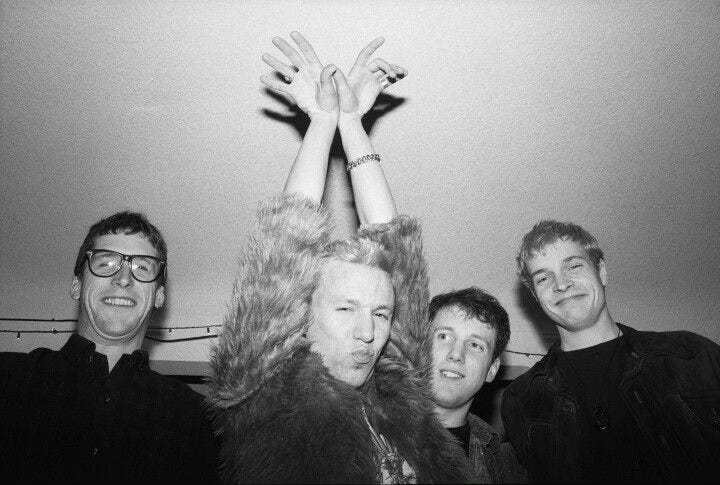Heatmiser | History of the Band
From Punk Roots to Poignant Poetry: The Journey of Heatmiser and the Origins of Elliott Smith
Formation and Early Years
Formed in Portland, Oregon, in 1991, Heatmiser was the brainchild of college friends Neil Gust and Elliott Smith. Initially, they drew heavily on their shared influences, from punk rock to the burgeoning alternative scene. Tony Lash and Brandt Peterson soon joined, rounding out the lineup to set the foundation for Heatmiser's distinctive sound.
Willie Dillon suggested this artist for a future Dig Me Out podcast episode. Each month, our Patrons are presented with a selection of albums suggested by listeners and asked to vote for their favorite.
Musical Style and Evolution
Heatmiser began with a gritty, lo-fi aesthetic typical of early 90s alternative rock but evolved significantly throughout the decade. Their early work showcased a raw, energetic vibe, but as the 90s progressed, their sound matured, incorporating more sophisticated melodies and harmonies. This evolution was particularly evident as Smith's songwriting prowess became more pronounced, steering the band towards a more nuanced, emotionally resonant style. This blend of rough edges and refined musicality helped define their unique position in the alternative rock spectrum.
Discography and Notable 90s Albums
"Dead Air" (1993)
Released by Frontier Records, Dead Air captures Heatmiser's early raw energy. The album's aggressive guitar work and anxious lyrics resonate with the disquiet of youth, setting a solid foundation for their musical journey.
"Cop and Speeder" (1994)
Continuing with Frontier Records, Cop, and Speeder brought more complex arrangements and precise vocals. Critics noted the album’s cohesive sound and deeper emotional engagement, showcasing the band's growing sophistication.
"Mic City Sons" (1996)
Considered their magnum opus, Mic City Sons was released by Virgin Records' subsidiary, Caroline Records. This album significantly departed from their earlier punk influences, featuring more melodic and subdued tracks. The production, handled by the band and Tony Lash, highlighted a refined approach to songwriting and performance, with tracks like "Rest My Head Against the Wall" demonstrating a matured, introspective version of Heatmiser.
Critical Reception
Heatmiser received mixed reviews during their active years. While some early critiques focused on their rough production and perceived lack of direction, later reviews for albums like Mic City Sons praised the band for its evocative lyrics and compelling melodies. Critics often highlighted Smith’s contributions, noting how his songwriting could evoke profound emotional responses. Despite not achieving mainstream success, their work was highly regarded in indie and alternative rock circles.
Though Heatmiser disbanded in 1996, their influence lingered, mainly through Elliott Smith's successful solo career. Bands such as Death Cab for Cutie and Bright Eyes have cited Heatmiser as a significant influence, drawn to their blend of sharp lyrics and compelling melodies. The legacy of Heatmiser is also seen in how they navigated the transition from punk's rawness to more melodious, introspective music, which would become a hallmark of late 90s indie music.
Heatmiser's journey through the 90s was a microcosm of the decade's musical evolution. From the gritty, unrefined edges of Dead Air to the polished introspection of Mic City Sons, they encapsulated the growth of alternative rock. Although they never reached the heights of mainstream success, their musical journey remains a critical puzzle piece in understanding the complex tapestry of 90s music. Their story is not just about a band but about a transformative era in music, reflecting broader shifts in the industry and listener’s tastes. Heatmiser's legacy, mainly through Elliott Smith's later success, underscores the lasting impact of their relatively brief existence. Their music continues to resonate with those who seek depth and authenticity, hallmarks of a genuinely influential band.
Sources
Wikipedia
Rate Your Music
AllMusic
I Hate the 90s blog
Amazon





